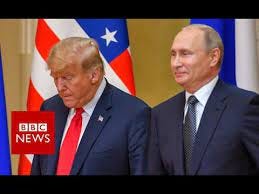Trump sticks up for his buddy Vlad at the G-7 summit
He says the Russian leader was 'very insulted' when he was booted from the group over a decade ago
By Sam Bellamy
History has never been Donald Trump’s strong suit. Neither, for that matter, has the present. On Monday, he tried to reshape both into his own inestimable image at the opening of the G-7 summit in Calgary.
With Canadian Prime Minister Mark Carney to his left and Secretary of State Marco Rubio and other toadies to his right, our stable genius complained that the G-7 – composed of the U.S., Britain, Canada, France, Germany, Italy and Japan – should still be the G-8.
At roughly the1:05 mark in the video linked below, Professor Trump begins a brief through-the-looking-glass lecture on the expulsion of Russia from the group over a decade ago.
“The G7 used to be the G8. Barack Obama and a person named Trudeau didn't want to have Russia in," he says. "I would say that that was a mistake because I think you wouldn't have a war right now if you had Russia. And you wouldn't have a war right now if Trump were president four years ago. But it didn't work out that way. But it used to be the G8.”
The war he’s referring to is Russia’s war with Ukraine – the origins of which date back to:
§ February 2014, when Vladimir Putin sent unmarked troops to the Crimean peninsula in Ukraine, seized its government and staged a bogus referendum formalizing the Russian takeover. (At first, he denied the soldiers were his but later admitted that yeah, he knew ’em. Sent ’em, in fact. What of it?)
§ April 2014, when Russian-back paramilitary soldiers marched into the eastern Donbas region of Ukraine.
Between those two events, in March 2014, the majority of G-8 leaders – including then-President Barack Obama and then-Canadian Prime Minister Stephen Harper (not Justin Trudeau, in Trump’s version) – voted to expel Russia.
The group’s official statement included this: “International law prohibits the acquisition of part or all of another state’s territory through coercion or force. To do so violates the principles upon which the international system is built. We condemn the illegal referendum held in Crimea in violation of Ukraine’s constitution.”
Trump, who’s hinted at the possibility of U.S. invasions of Canada, Greenland and Panama in his second term, apparently thinks Putin was treated unfairly. He tried and failed to get the G-7 to readmit Russia in his first term and obviously hasn’t given up.
“This was a big mistake. You wouldn't have that war,” Trump said Monday. “You know, you have your enemy at the table – he wasn't really an enemy at that time.”
Well, sure. He was a pal. If Obama and Harper hadn’t picked on Putin, he probably never would have launched a full-scale invasion of Ukraine in 2022, and it probably never would have occurred to Britain, France, Italy or Germany that a Russian army on the move might pose a threat to their sovereignty. Nothing in their histories to indicate otherwise, as the Germans and Italians undoubtedly pointed out.
Trump, who thinks the Nobel Prize would look beautiful in a display case at Mar-a-Lago, wants us all to believe that he’s a great peacemaker and that Putin listens to him. “Putin speaks to me; he doesn’t speak to anybody else,” he said at another point Monday, “because he was very insulted when he got thrown out at the G-8, as I would be, as you would be, as anybody would be.”
John Bolton, one of Trump’s national security advisors in his first term, told The New York Times that his old boss didn’t seem to understand the reason for Russia’s expulsion or that the group is intended for like-minded democracies. “Apparently, still doesn’t understand,” Bolton said.
Trump has long claimed he would have prevented the Russia-Ukraine war, the Hamas attack on Israel and assorted conflagrations around the world if the 2020 election hadn’t been stolen from him. He also repeatedly said he’d end the war his first day back in office.
His estimation of his ability to make a deal is astronomically high. He’s opined on numerous occasions that the conflict between the North and South could have been resolved to avoid the Civil War – humbly leaving it to us to conclude that he would have been just the man for the job had he been alive.
No word, as yet, on whether he would have prevented World Wars I and II. Perhaps he’s holding back, realizing that success in those negotiations would have put a damper on his love of military parades.


